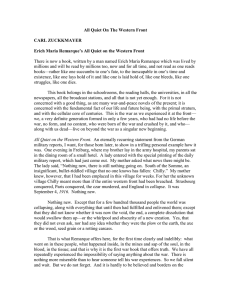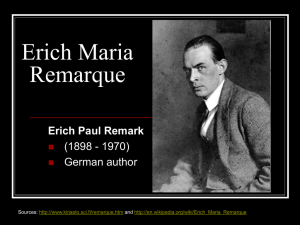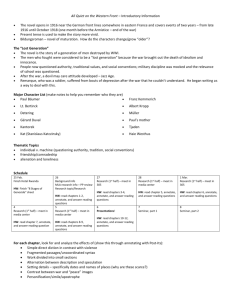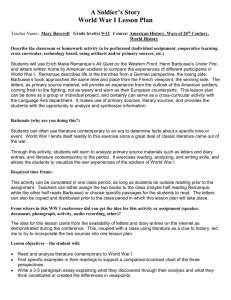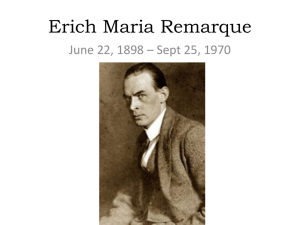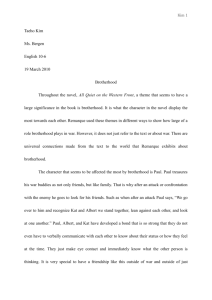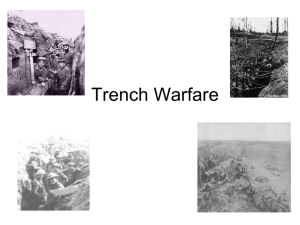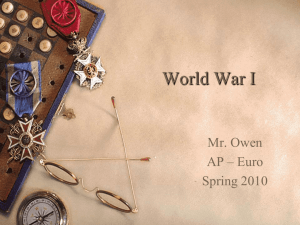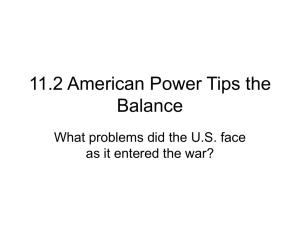All Quiet on the Western Front lessons ASlevel
advertisement
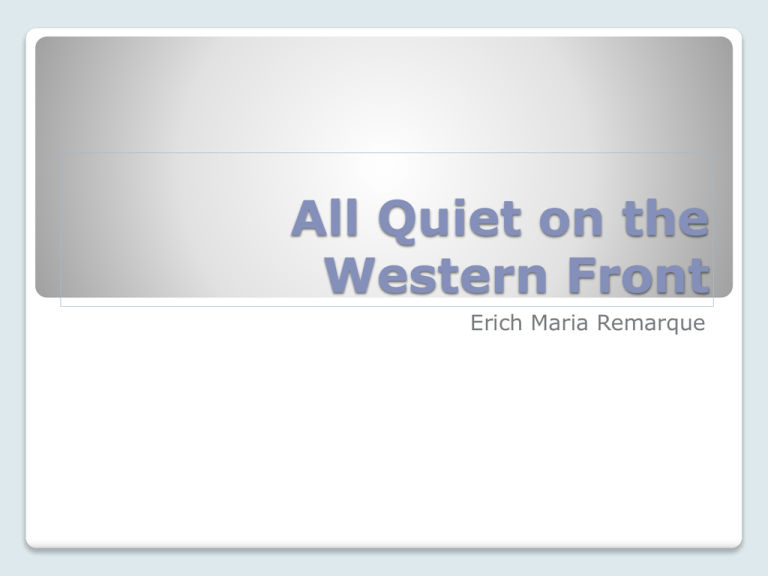
All Quiet on the Western Front Erich Maria Remarque Notions of War Traditional Reality Rhetoric Sacrifice Service … … … … Brutal … … … … … … How did the ‘Great War’ change attitudes to war/challenge previous conventions and traditions. Did it change ways of writing about war? ‘The Charge of the Light Brigade’ ‘Mental Cases’ Wilfred Owen Alfred, Lord Tennyson Presentation of war Presentation of war … … … … - Look at two poems: one an early pre-Great War poem and the other written during WW1. - How would their ‘original’ audiences readings of the poems differed from yours, and why? What implications are inherent in the act of reading? (context…) Implications of ‘reading’… Reading: ◦ is an active process: you as reader are an active creator, not a passive recipient of second-hand opinion – you are the maker of meaning; ◦ can never be innocent: all readings are historically, socially and individually specific – you bring your own personal context and experience to the text. Meaning: ◦ for an individual reader depends as much on what is brought to the text (by you) as on what is contained within it – your own experience will influence the way you read the text; ◦ Will not necessarily be instantly accessible – at this advanced level of study it is likely that you will need to research difficult or obscure references/vocabulary before you can tease out meaning; ◦ Will be different on different occasions and changeable as a result of discussion/reflection/critical reading; ◦ can be multiple; different readings of a text can co-exist: some texts are ambiguous or capable of delivering multiple meanings. It is your own selection of and response to textual evidence which will determine your own personal interpretation. Consider the following two statements and their implications. A Soldier's Declaration I am making this statement as an act of willful defiance of military authority, because I believe that the war is being deliberately prolonged by those who have the power to end it. I am a soldier, convinced that I am acting on behalf of soldiers. I believe that this war, upon which I entered as a war of defense and liberation, has now become a war of aggression and conquest. I believe that the purposes for which I and my fellow-soldiers entered upon this war should have been so clearly stated as to have made it impossible to change them, and that, had this been done, the objects which actuated us would now be attainable by negotiation. I have seen and endured the sufferings of the troops, and I can no longer be a party to prolong these sufferings for ends which I believe to be evil and unjust. I am not protesting against the conduct of the war, but against the political errors and insincerities for which the fighting men are being sacrificed. On behalf of those who are suffering now I make this protest against the deception which is being practiced on them; also I believe that I may help to destroy the callous complacence with which the majority of those at home regard the continuance of agonies which they do not share, and which they have not sufficient imagination to realize. Siegfried L. Sassoon, July 1917 “This book is intended neither as an accusation nor as a confession, but simply as an attempt to give an account of a generation that was destroyed by the war – even those who survived the shelling.” What do you think Remarque meant and intended with this epigraph? How might it prepare us for what is to come? Homework – due N/L Research Remarque’s life: ◦ Dates; ◦ Places, …. How was his novel received? ◦ At home and abroad. ◦ Did its reception change? Read chapters one to five. ◦ In chapter one consider Paul’s discussion of his teacher. ◦ What effect/impact do you think Remarque intended with chapter one? Using the AOs as your starting points, read the scene in which Paul tells us about his teacher Kantorek. Make notes under each AO for this scene. Be prepared to feedback. E.g., ◦ AO1 How do you respond to the characters in this extract? ◦ AO2 What do you make of the choice of narrative viewpoint? What do you notice about the choice of language? ◦ AO3 What connection can you make between this text and other texts from your wider reading (suggestion: Sassoon’s ’Declaration’). ◦ AO4 How has Remarque used the context of World War One in this extract? Close reading: Chapter One – Paul remembers his teacher, Kantorek By the next lesson you will inform the class which additional text you are going to be studying for your wider reading. You will be presenting your text to the class in the form of a two sided, typed handout. Your handout will address themes and links with other reading and will be strongly focused on the AOs. Your handouts will be due the week before half-term. Wider Reading Assignment Dehumaisation Chapter four: the men are ‘human animals’; new recruit defecates in his pants; Paul in the coffin blurs boundaries between the living and dead. Chapter six: fighting with the rats to preserve their food; animalistic savagery of battle; killing to release anxiety and stress, not out of patriotism. Chapter seven: how Paul is ‘seen’ by the French woman compared to how he wants to be ‘seen’; how he is treated by people at home. Chapter eight: Russian soldiers. Chapter nine: Paul’s face-to-face kill. Your suggestions… dehumanisation The brutalities of war strip away the moral and mannered aspects of human beings…trace Remarque’s treatment of ‘dehumanisation’ in the novel with specific reference to key scenes. Read up to and including chapter 9. Make notes for each chapter on how Remarque presents the loss of humanity and dignity. Keep the AOs strongly in mind when making your notes. Homework: for next lesson The presentation of nature and the realities of trench warfare. Read the extract from D.H. Lawrence and then chose a scene from All Quiet that considers nature and the realities of trench warfare. Compare the writers’ treatment of these two themes. Make notes (AO specific). The presentation of nature and the realities of trench warfare. Chapter four: ◦ “The earth explodes in front of us.” Chapter six: realities of trench warfare. Chapters: ◦ ◦ ◦ ◦ ◦ one/two; tree/four; five/six; seven/eight; chapter nine. Task/Homework: Finish reading the novel. Consider Remarque’s use of nature throughout the novel with specific reference to key scenes. The presentation of nature and the realities of trench warfare.
